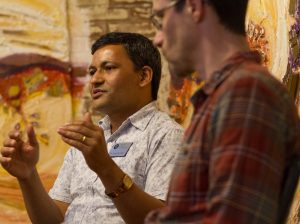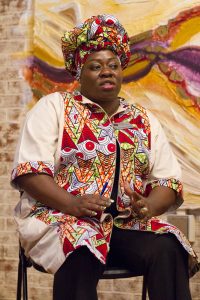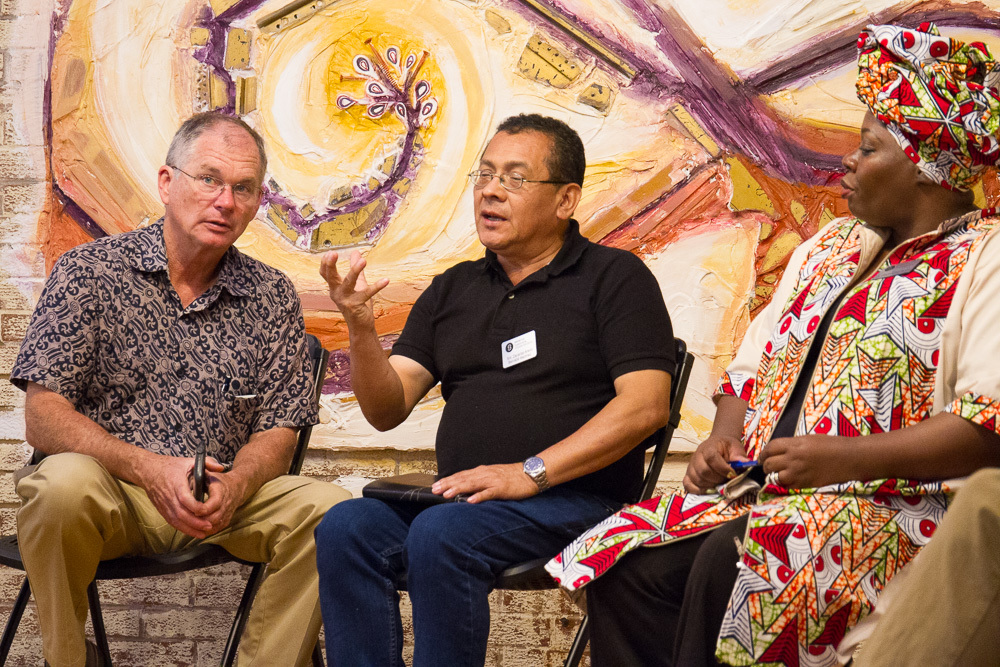Zacharías Martínez, Sibonokuhle Ncube and Durga Sunchiuri never met before this month. Each is from a different continent, but they share a common grief: their nations are experiencing the effects of climate change.
Since mid-September, the three have been speaking to groups in Indiana, Virginia and other neighboring states at the invitation of the Center for Sustainable Climate Solutions (CSCS,) a nonprofit organization affiliated with Eastern Mennonite University, Goshen College and Mennonite Central Committee (MCC). The tour concludes on Oct. 5.

If there is a common thread running through the experiences the representatives from the Global South, it is water: too little water to grow crops or too much water at the wrong times.
Nepal has experienced both extremes, enduring severe flooding in the southern part of the country in 2017 and yet experiencing a decreasing supply of water in the mountains.
“Eight hundred million South Asian people depend on water from the Himalayas,” explained Sunchiuri, an MCC staff member in Nepal. As temperatures warm and the ice recedes, droughts and the reduced flow combine to threaten not only the tourist industry that Nepal is renowned for but the lives of rural farmers.
Sunchiuri told stories about an apple farmer whose trees will no longer bear fruit and a village where women are walking two hours a day to obtain water because their water supply has dried up. Lack of water also has hampered rebuilding following the April 2015 earthquake, because cement can’t be made without water. Some families remain homeless, he said.
Ncube, a double doctoral candidate in global management and human services, is a native of Zimbabwe and the only member of her high school class who still lives in the country. The rest have fled the 90 percent unemployment rate and droughts that come as frequently and regularly as labor pains instead of in a five- or 10-year cycle.
“For me, it’s a calling,” Ncube said, referring to staying in her home country to help her people who are suffering because of climate change and encouraging the church to be a leader in addressing the crisis. “This is where I think the life of God is,” she said. Ncube serves with the Brethren In Christ Church’s Compassionate Development Services, an MCC partner.

Ncube cited climate change as one of the factors that created this month’s cholera epidemic in the capital city, Harare, where she lives. Migration to the city from the parched countryside weakened the already strained septic infrastructure.
In a speaking engagement on Sept. 18, the group met with northern Indiana pastors who gathered to discuss ways to address the denial and despair that surrounds climate change.
“Make climate change a main theme within all that you do,” advised Martinez, who sees food shortages, malnutrition and conflicts over water affecting people in El Salvador. He works with Asociación Nuevo Amanecer de El Salvador (ANADES; New Dawn Association of El Salvador), an MCC partner organization seeking to create just and sustainable communities.
Oscar Romero, a Roman Catholic archbishop who was murdered during a mass in 1980 and who will be canonized as a saint on Oct. 14, was Martinez’s personal friend and mentor in the late 1970s. Martinez quoted his friend, “To align ourselves with God is not to become the lord of nature or to become an exploiter of our natural surroundings.”
CSCS and its partner organizations have made this tour possible because they believe that people in the U.S. need to hear informed and passionate voices from the Global South, said CSCS director Doug Graber Neufeld. Those here can learn from those who are living out their theological confessions in these situations, he said. ” Including these voices is a moral imperative from a climate justice perspective, as well as an effective way of personally motivating North Americans to change attitudes, policies and practices.”
